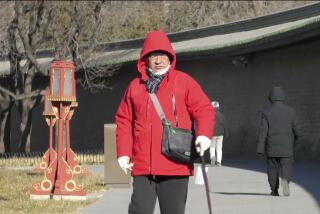Men in China Are Literally Dying for a Cigarette
BEIJING â Liu Boqi has seen the future, and it scares him. Itâs lying there in Ward 8, staring back through the watery eyes of Shi Benai.
For days, Shi has been bedridden, waiting to have a walnut-sized tumor removed from his right lung. Liu, an oncologist, hasnât had the heart yet to tell his patient that the cancer is fairly advanced, the product of years of heavy smoking.
âI smoked three or four packs a day,â Shi admitted weakly, his arm hooked up to an IV drip monitored closely by his hovering wife. âMy fingers were black.â
Throughout the rest of the ward, dozens of patients like Shi wait for surgery that they hope will save them from becoming yet another statistic in an escalating public health disaster of epic proportions.
Simply put, Chinese men are dying for a smoke. Already, 1 in every 8 male deaths here is caused by smoking, a grim ratio expected to rise dramatically, to 1 in 3, by the year 2050. The American Cancer Society estimates U.S. tobacco-related deaths at 1 in 5 Americans. If current patterns hold, experts say, nearly 3 million deaths a year in China will be attributable to tobacco, making it by far the leading cause of death in the nation, the worldâs biggest tobacco killing field.
Most of the epidemicâs victims will be men like Shi, 55, longtime smokers who began lighting up in their teens. Most will die prematurely, before their 70th birthday. And most will contribute to a social crisis that will spawn not just staggering health care costs but also a whole class of women left behind, nicotine widows forced to fend for themselves, their golden years spent alone.
âIâm alarmed. As a doctor, I feel itâs my responsibility to help people,â Liu said. But halting the trend, he said, is like âstopping a flood.â
The key, anti-tobacco advocates agree, is getting at people early in life to prevent them from lighting up, particularly young men, since smoking is almost exclusively a male pastime in China. Three hundred million Chinese men--70% of the male population and more than the entire U.S. population--smoke, compared with just 1% of Chinese women. The average age at which boys take their first drag has dropped from 15 to 13.
But changing habits is easier said than done in a culture where cigarettes are ubiquitous--presented as wedding gifts, used as bribes and laid out for guests in homes the way Americans might now offer peanuts.
And despite a well-publicized study last year warning of the decimation ahead, government action to promote public awareness remains minuscule. A report this month by the Journal of the American Medical Assn. found that only 40% of Chinese know smoking can cause lung cancer. Even fewer know it can lead to heart disease.
âFor so many years we said there was no harm from smoking. Now weâre saying there is,â Liu said. âTo change peopleâs ways of thinking is tremendously difficult.â
Liu, who has 35 yearsâ experience as a physician, works at the Cancer Research Institute in Beijing, the best cancer treatment center in the country.
Because of booming demand, the hospital opened Ward 8 last year as a unit dedicated exclusively to lung cancer patients, who cycle through the ward every few weeks for surgery. The 40-odd beds never grow cold.
Exact figures for the number of lung cancer deaths in China are hard to come by. But researchers say that middle-age smokers here are three times as likely to contract lung cancer as nonsmokers and twice as likely to suffer from other respiratory diseases, such as tuberculosis.
Liu Daojin wound up in Ward 8 after coughing up blood for a year yet ignoring his wifeâs entreaties to see a doctor.
âIt didnât affect my appetite, my job or my sleep, so why should I go?â asked Liu, a worker at a dredging company in Tianjin, about 80 miles southeast of Beijing.
Finally, though, he gave in. When the diagnosis of lung cancer came back, his doctor refused to tell him directly, breaking the news instead to Liuâs wife, Wang Zhifang, who nearly collapsed.
Wrapped most of the day now in his hospital pajamas, Liu, 56, remains in remarkably buoyant spirits, confident that surgery to remove his tumor will be successful. He has forsworn his three-pack-a-day addiction--thatâs 60 cigarettes a day--although it was initially a struggle.
His wifeâs nerves are not in such good shape. âI hurt all over. I canât sleep, I canât eat,â she said, fearful of the unsaid: the prospect of growing old alone.
âThereâs no helping it. Iâll have to cope,â Wang said, biting her lip. âThere are my children to think of.â
There are three of them--including a 21-year-old son who, like his ailing father, started puffing as a teenager and refuses to quit, although the young man wept when he saw his dad laid up in the hospital.
âI told him, âYouâve seen your fatherâs condition and know everything Iâve told you,â â Wang said. â âThis is my last warning. I wonât say anything more.â â
Reaching young men like Wangâs son is the goal of tobacco-control activists, who had hoped that last yearâs study in the British Medical Journal would galvanize the government into stronger action, much as the 1964 surgeon generalâs report on smoking did in the U.S.
The Communist regime can count some successes, such as ordinances in most major cities banning smoking in public places.
Yet the rules are only spottily enforced, as evidenced by the young man who lit up one morning in the stairwell of the cancer hospital itself, directly beneath a no-smoking sign. Such bans merely seem to displace smokers, not encourage them to kick the habit.
Critics point out that the cash-strapped Beijing government occupies a dicey position, professing its commitment to anti-smoking efforts while relying on cigarette companies--most of them state-run--for its single largest source of revenue.
Last year, taxes and profits from tobacco fed the government $115 billion, or 8.8% of its income, said Zhang Yifang, chairman of the national Chinese Assn. on Smoking and Health. China is both the worldâs largest tobacco producer and tobacco consumer. An astonishing one-third of all the cigarettes smoked in the world today are consumed in China, for a total of 1.8 trillion a year: the equivalent of a pack a day, every day, for every man, woman and child in the U.S.
âTobacco is a key money-making industry for the state, so thereâs no way for the state to cut off production altogether,â Zhang said. âTheyâd go bankrupt.â
Public health experts have tried to convince the government that the costs of health care and lost worker productivity outweigh the money pouring in, but to no avail. The Beijing regime even refused to impose a small excise tax on cigarettes for fear of inciting âsocial instability,â activists say.
So the government relies instead on Zhangâs association as its foremost tool for spreading the word on smoking. The central Health Ministry in Beijing referred all inquiries to the organization.
Its budget, however, is microscopic to the point of absurdity: just $36,000 a year, most of which goes to the salaries of the associationâs nine staff members--and only $6,000 of which actually comes from the government itself. (Provincial branches of the association have even less money.) By contrast, California alone spends $400 million a year on its anti-tobacco efforts. Activists here rely on donations and help from groups like the World Health Organization.
âItâs just to have an office in name only,â one critic complained of the Chinese governmentâs attitude toward Zhangâs association.
Zhang does the best he can, issuing anti-smoking teaching materials to selected schools throughout China--a paltry eight to 10 sets per province, each of which boasts millions of schoolchildren.
The materials are smart, glossy and occasionally gruesome, like the brochure containing photos of blackened lungs and other diseased organs. There are simply not enough materials to go around.
Role models, too, are in scarce supply. Characters on TV shows constantly puff away, celebrities demand high fees for lending their star power to anti-smoking campaigns and an estimated 50% of doctors and teachers light up, making their warnings of the dangers of smoking ring hollow.
âSmoking is bad for your health, but so what?â said Chen Wei, a skinny 15-year-old who has already been smoking for two years. âPollution is bad for your health too, but you canât do anything about it. Smoking wonât add too much to it.â
For Chen, lighting up and pulling on a cigarette is a mark of maturity, not a path to potential illness.
âThe starting age for smoking is getting younger and younger. Thatâs natural,â said the teenager, taking a drag after school while still dressed in his blue-and-white school uniform. âPeople mature earlier now. They get to know more, read more, watch more, grow up faster, so they start everything earlier.â
And once a smoker virtually always a smoker in China, where only a tiny fraction of people manage to give it up. For those wanting to quit, there is little institutional or social support and plenty of pressure from friends and co-workers to keep on smoking at every imaginable social occasion.
âI tried everything: eating junk food, using all kinds of medicines, both traditional Chinese and Western,â said Liu Liguo, 42, an inveterate inhaler of 20 years. None of the methods worked.
âSo many people smoke in China that you face the temptation all the time, almost everywhere,â he said.
Xue Jingang has stopped--at least temporarily, for no cigarettes are allowed in Ward 8. Xue, 44, has smoked for half his life. Now, with cancer gnawing at his lungs, he fears that life might be cut short.
As he awaits surgery, Xue contemplates the youthful hubris that brought him to where he is now--and the price not only he but his wife and young son may have to pay.
âI used to think, Iâm in good health. How can I get sick?â said Xue, a farmer from Jilin province.
âMy wife is too young to be left alone. How can I not think of that? Iâve failed her.â
More to Read
Sign up for Essential California
The most important California stories and recommendations in your inbox every morning.
You may occasionally receive promotional content from the Los Angeles Times.











